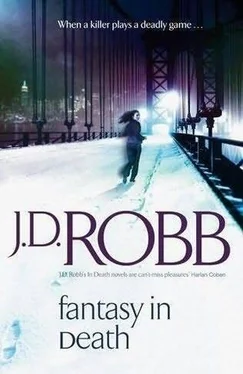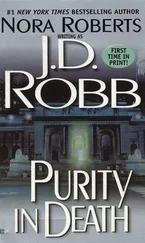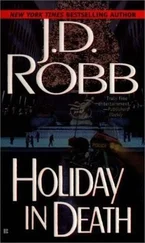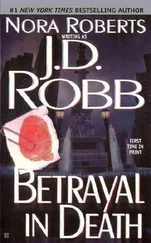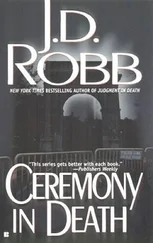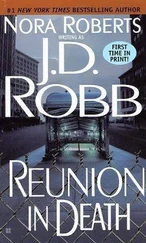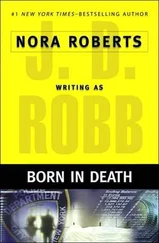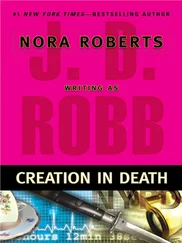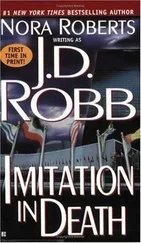“Improvements,” Eve concluded. “He’d take it home to test it out with the tweaks, or maybe add some from there.”
“That’s how it reads. Early days, they called it Project Super X.”
“You’re kidding.”
“No, seriously. Project Super X, or PSX. Playtimes after five or six on weekdays, and some long multi-player sessions on weekends. Anyone who worked on any section of it had to log in and know the passcode, then had a user code. The four user codes that had full access track back to the four partners, but if any of those who worked sections confabbed with any of the others who worked sections, they’d have most of it.”
“Then it could be duplicated.”
“Close.” Callendar took another swig from the bright orange tube. “It would take a lot of time, trouble, skill, and cooperation, but you could get close.”
“What about the scenario he was playing at TOD?”
“That’s trickier. Passing to you,” she said to Roarke.
“One of the security measures, what I’d call an on-the-fly sort of precaution, was to change user names and codes every few runs.”
“So if anyone tried to hack from outside, or inside, they’d hit a new wall.”
“Theoretically,” Roarke agreed. “Still, even with the firewalls and fail-safes, you’d only have to get lucky once, access from that point. I’ve found some hack attempts, some attempts at infections from outside sources, typical stuff, and none of it successful. And there are several hack attempts from inside, but they coincide with basic security checks. To run the game in its holo form, the player would have to input his current name, code, and ID with thumb- and voiceprint. All of those are possible to bypass, of course.”
Eve aimed a cool look. “Of course.”
“But they had their additional security, which would have sent out alarms at an attempted hack. Assuming the hacker hadn’t already bypassed those. The discs themselves, at least the one in Bart’s home unit and the copy we have here, are imprinted to jam if any of these steps are missed or the ID process fails. An attempt to remove the disc, as we learned, results in self-destruct.”
“I know all of this.”
“Laying the groundwork, Lieutenant. They were careful, clever, vigilant. But certainly not absolutely hackproof as nothing is. In any case, those precautions make it tricky to ascertain absolutely who played what and when. So we have to extrapolate.”
“Meaning guess.”
“A reasoned and educated guess based on probability. Bart used a variety of user names and codes between his home and office, but as with most people, he has a pattern, and he repeats. To simplify, I’ve had the computer cull him out and label him User 1 in both locations.”
He ordered the data on-screen. “Here you see the dates and times he logged in on their PSX, by location, and whether it was solo or multi-player. We’ve crossed that with the other players, going alpha last name, you have Cill Allen as User 2, Var Hoyt as User 3, and Benny Leman as User 4. We have a separate data run on every employee who worked on the game, when, how long, in what capacity. You’ll want to run an analysis on those, I expect.”
“Who’s particular pals with who, sleeping with who, how long they’ve worked there. I know the drill.”
Roarke smiled at her. “It’s taken us this long to get here simply because the log-ins for this game alone are legion, and between the four of them they used several dozen user names and codes. Next problem.”
“Would be?”
“The infinite variety of scenarios. They all have plenty of play on the defaults, but the bulk of the log-ins are off that menu. Some are saved either to play again with exactly the same elements, or discarded, or saved and replayed with alternate elements. Or two scenarios might be merged.”
“Doesn’t it keep a record? What’s the fun of playing if you can’t keep score?”
“It does, and the holo-unit would hard drive it. The problem is the data on Bart’s holo doesn’t match any of the scenario names or codes from prior uses.”
“A new scenario?”
“Possibly. It’s listed as K2BK-BM.”
“Bart Minnock,” Eve concluded. “His particular game? Or did they routinely label them with initials?”
“No, they didn’t. There’s no coordinating listing on the copy U-Play messengered over today. The scenario isn’t on disc under that name or code. There’s nothing on his holo-unit that shows him creating it on the day he was killed, or any other day. He put the other copy in, the one we’re trying to reconstruct, and called for that game, with a request to begin at level four.”
“You don’t start on level four if you’ve never played it before. You want to start at the beginning.”
“Yes, you would. Or certainly the probability is high.”
“So he played it before, but on the copy he used it had been given a name or code not previously used.” She walked and thought. “He had a date, so he had limited time. He didn’t want to waste it on the early stages. He pushed it forward. A section he wanted to work on, or one he particularly enjoyed, or one he had trouble beating before. But he’d played it before. There’s no question it was solo play?”
“None,” Callendar told her.
“The killer might have started the game, logged it that way to cover.”
“Then he should’ve been logged as observer or audience. The room only registered one player, one occupant. If someone else was in there, he found a way around it.”
“Murder takes at least two players,” Eve murmured. “He plays. He gets bruised up some, wrenches his shoulder. How?” She thought of Benny, smooth and graceful with his katas. “He knows how to fight, how to defend. He takes gaming seriously, so he’s studied, practiced, but there’s no sign he put up a fight. No trace, no blood, no fiber, no nothing from the killer in that room. And every reconstruct tells me he just stood there while the sword came down on him.
“Someone else’s scenario,” she considered. “The killer creates the disc, adding defaults or elements or openings, and recodes it. Something that could override the system long enough to pull this off. That’s what these guys do, right? Find new ways. New ways to play the game. What did he play the most?”
“There are four scenarios he favored,” Roarke told her. “He’d mix up and alter elements here and there, but usually stuck with the same basic story line and character grid. He named them Quest-1, Usurper, Crusader, and Showdown.”
“Are they on the copy?”
“They are.”
“Stats?”
“We’re pulling and collating them now.”
“Good. And when you run the games, prioritize anything with swords. It’s pizza and a pipe wrench.”
“What the hell does that mean?” Feeney demanded. “You’re losing it, kid.”
“No point in wasting a good pie. No point bringing a sword to a blaster battle. You want to make use of what you’ve got, and take what’s useful with you. He took the sword, but he left the disc. The disc would be useless to us after self-destruct, and incriminating to him if found in his possession.”
She stuck her hand in her pocket. “A woman says to the husband she wants dead, Hey, honey, I’ve just got to have a pizza. Be a sweetheart and run down and get us a large veggie. Now he’ll probably say, We’ll just have it delivered, but she’s ready for that. Oh, they take too long and I’m just starving for a pizza. Please, baby? I’ll open some wine, and maybe I’ll change into something you’ll like. We’ll have a little pizza party.”
“What the hell does that have to do with this?”
She glanced at Feeney. Cynical and rough-edged he might be, but he was a blusher. “Working it out. The guy goes for pizza-going to get lucky, so hey, it’s worth the walk. The wife who wants him dead has her lover waiting with the pipe wrench. Smack, bang. No need for a divorce and all that bother, no point losing the nice chunk of life insurance-and hey, there’s a nice fresh pizza, too. It’s mean, just a little mean, but efficient and practical, too, to take the pie, leave the wrench.”
Читать дальше
